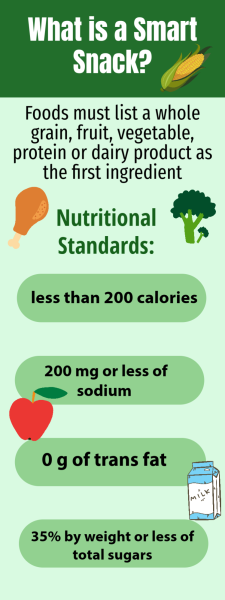A table filled with snacks and drinks next to the courtyard stands alone during lunch with students gathered; however, the snacks seem different from past years. Nature Valley granola bars replaced chips and candy and Dr. Pepper Zeros replaced regular Dr. Peppers.
Starting this school year, clubs have a limit to selling unhealthy snacks containing a certain amount of sugar to six exemption days but can sell snacks any day if the food sold contains less than a certain amount of sugar. This change affects many students and the way they raise money.
“I’m part of two different clubs that we’re doing fundraisers for right now. One of those is National Honor Society, and I believe it has affected us a little bit negatively,” senior Salem Alonge said. “Since the NHS fundraiser can no longer sell the boxes of candies, we are now doing TeamFunded, which is our mandatory [fundraiser]. Every member of NHS has to share the link at least 50 times and get $30 in sales, which for some students is a little unattainable, which is why I really did enjoy the sale of the chocolates.”
For most clubs, they have to raise a minimum amount of money to be able to carry out their usual activities and traditions. If goals cannot be met, students will either have to make up for it from their own pocket or will have to sacrifice some activities.
“We are usually able to sell the candy or the chocolate and raise around $15,000. We need $15,000, or at minimum $10,000 for our senior field trip and for induction, so we’re really struggling here,” NHS sponsor Holly Mooneyham said. “If we aren’t able to raise the $15,000, we are going to have to compensate for that by having to raise club dues, and I did not want to do that as I don’t want it to affect my members.”
This regulation resulted from former First Lady Michelle Obama’s movement for healthier diets in children. It attempts to promote healthier eating habits in the youth.
“It’s a federal law that is called the Healthy Hunger-Free Kids Act,” principal Ben Renner said. “It’s not really a change. It’s been in place since 2010 when they established the foods with minimum nutritional values. The White House program tried to tackle obesity with a focus on childhood obesity.”
With the regulations, clubs have to be particular about what snacks they sell. Foods must be considered a “Smart Snack”, which must be determined by the nutrition standards of sugar, calories, fats and sodium.

“[The legislation] includes smart snacks and how much percentage of sugars and carbohydrates that the students have in their snack,” assistant principal Lara Herring said. “We just have to monitor that because we’re only allowed a certain amount to sell.”
In the past, clubs displayed signs stating that students couldn’t consume the snacks they purchased during school hours; however, when the administration noticed students did not comply, they enforced stricter measures.
“We’ve always implemented [the legislation],” Herring said. “We had a sign that said students were not allowed to consume the snacks during the school day, but we started noticing that the students were still eating the snacks during the school day, so we had to start being more particular about the days we allow students to sell snacks.”
As a part of the act, schools allow six exception days where clubs can sell any snack, regardless of the nutritional value. To participate in fundraisers on those days, club sponsors receive a spreadsheet from Herring with the dates available and select a convenient day.
“We sent out a spreadsheet to all of the club’s sponsors, and they had the opportunity to set up for those days so that they can sell anything that they want,” Herring said. “During those six days, we had several clubs sign up for the first event, and it seemed to be pretty successful as far as the participation with the students. I think all of the clubs had a lot of representation for their students to help sell and we were able to make a little bit of profit off of that.”




